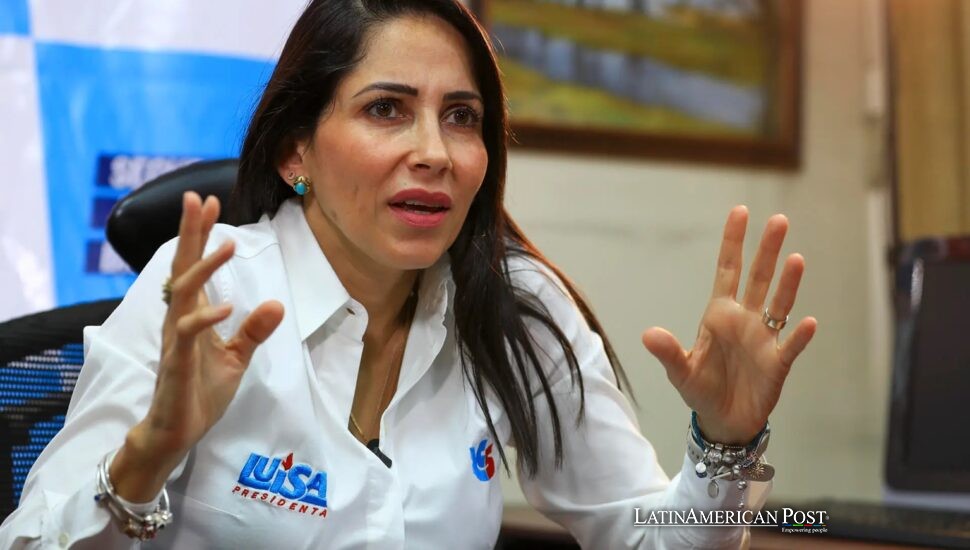Ecuador Heads for April Run-off In Tense Showdown

Ecuador is officially heading to a presidential run-off on April 13 after incumbent Daniel Noboa and leftist Luisa González finished within a razor-thin margin of each other. Citizens, burdened by gang violence and economic woes, now hope for a decisive final vote.
Run-off Confirmed Amid Ultra-Close Results
Ecuador’s national electoral council has declared that voters will return to the polls on April 13 for a run-off between incumbent Daniel Noboa and left-wing challenger Luisa González. With just under one percentage point separating them in the official tally—Noboa at 44.5% and González at 44.1%—the announcement dispels prior uncertainty: the second round is no longer a mere possibility; it is happening.
This showdown mirrors the pair’s previous clash in 2023 when they competed in a truncated-term election. Then, Noboa emerged victorious. Recent opinion polls had predicted he might secure another triumph outright. Instead, the close final count has propelled both candidates into an extended campaign period, giving voters additional time to evaluate which approach they trust most to rescue Ecuador from mounting insecurity.
Central to each platform is the promise of bringing an end to the spiraling gang violence that has gripped Ecuador, once considered among the safest nations in Latin America. Noboa, a 37-year-old heir to a prominent business family, insists that his deployment of the military on city streets and inside prisons has already lowered violent deaths, subdued prison riots, and led to the capture of significant crime bosses. González, 47, representing the left-wing Citizen Revolution movement, contends that more robust measures are needed: she advocates full-scale operations by the military and police, a purge of corrupt officials, and social spending directed at Ecuador’s most dangerous areas.
Regardless of the outcome, it is clear that Ecuadoreans are deeply anxious. Thousands of citizens cite rampant kidnappings, routine extortion attempts, and drug-related killings as daily realities. The April 13 run-off arrives against a backdrop of tense public debate on whether Noboa’s militarized tactics should continue or if González’s comprehensive—yet untested—approach may prove more effective.
A Nation Plagued by Organized Crime
Ecuador has turned from a safe harbor into a criminal center because of its position next to drug-producing nations. Colombia, along with Peru, produces massive cocaine quantities that move through Ecuador’s ocean ports toward other continents. The ports’ ideal location attracts rival criminal groups fighting aggressively to secure these profitable shipping lanes. As criminal enterprises multiply, kidnappings for ransom have escalated, and homicides have soared to levels once unthinkable in the country.
One chilling example comes from a southern Guayaquil resident called “Jorge,” who recounted his story to the BBC. His father, Marcos Elías León Maruri, was kidnapped by members of the Los Tiguerones gang, which then demanded a steep ransom. Hours later, Jorge received a shocking text: “I have your father. How much will you pay for the life of your family?” A video followed, showing his father bound and grievously tortured.
The captors initially demanded $100,000, an impossible sum for Jorge. Even after frantic negotiations and an agreement on a lower payment, the tragedy did not end. Police alerted him to a body matching his father’s description; the gang had left behind a grim mockery by tying one of his father’s severed fingers to the corpse. Jorge told the BBC he rarely ventures outside now. He has surrounded his home with surveillance cameras and is too terrified to continue working, knowing the criminals could track him down.
The murder of Jorge represents one among many cases in Ecuador. Records show that criminals kill a citizen every two hours, along with seven kidnappings each day. Such extreme violence influenced the first electoral round, where 16 presidential hopefuls competed but failed to reach the necessary victory margin. A run-off election approaches next. The citizens demand specific solutions from candidates about methods to decrease killings or secure protection for the population against criminal organizations.
Two Opposing Visions for Security
The contrast between Noboa’s and González’s proposals encapsulates the issue’s divisiveness. Both contenders have promised to combat Ecuador’s deep-rooted criminal networks but disagree on their strategies.
Daniel Noboa, the 37-year-old president, argues that his iron-fisted policies already bear fruit. The president deployed armed forces to monitor urban areas, permitted aggressive responses in high-risk zones, and built additional detention facilities. He states that these actions have effectively restricted criminal organizations. According to him, lethal incidents decreased by 15 %, along with the arrest of major gang chiefs who previously acted freely.
However, citizens object to Noboa’s expansion of police authority. Several events fueled public outrage over the potential abuse of power. A troubling incident exposed this crisis after military personnel arrested four young men on suspicion of theft. Officials discovered the victims’ burned as well as mutilated bodies, which triggered criminal investigations of 16 service members. The government denies wrongdoing, stating it released the teenagers, but the tragedy has fueled national debates over human rights and the judiciary’s ability to hold armed personnel accountable.
Some residents applaud Noboa’s willingness to “meet violence with force,” as they see criminals employing grenades, machine guns, and other weaponry typical of warzones. Others argue that filling prisons and increasing patrols can only do so much unless deeper social, judicial, and economic reforms are enacted. Even supporters of the crackdown say corruption within courts often undermines police work; gang members are sometimes released soon after being arrested.
Luisa González, on the other hand, has laid out a multi-pronged approach that fuses law enforcement efforts with socio-economic measures. A close ally of former President Rafael Correa, she pledges to fight violence with expanded military and police operations. She aims to transform the judicial system by removing dishonest judges and prosecutors who help release dangerous criminals. González plans to direct social assistance to districts severely affected by unlawful acts, as she believes better living conditions reduce the attraction of criminal groups.
A central theme in González’s campaign speeches is “transforming the country” from one living in fear to one that invests in opportunity. She has pledged 20,000 new police officers, more resources for detective work, and specialized units to investigate kidnappings and extortion rings. Skeptics worry that her plans might overload the national budget. At the same time, critics from Noboa’s camp argue that she has yet to explain precisely how she will pay for these measures without reversing some of the current administration’s security gains. Still, her pledge to bolster human rights training resonates with a segment of voters distraught by alleged abuses under Noboa’s watch.
Heartbreak, Anger, and Calls for Change
As the April 13 run-off approaches, local stories of suffering continue to underscore the high stakes. While official statements by candidates have dominated headlines, personal testimonies—like those recorded by BBC interviews—reveal a tapestry of grief, hope, and frustration at a government system perceived as slow to respond.
Luis Arroyo described to the BBC how his two teenage sons, Ismael and Josué, were seized by soldiers after a football game. Their bedroom remains frozen, strewn with clothes and sports memorabilia, awaiting boys who never return. After enduring the grim discovery of their mutilated remains, Luis struggles to fathom how a supposedly law-abiding force could subject young people to such brutality. “They took four children away,” he told the BBC. “Then went home for dinner.” His anguish epitomizes many citizens’ distrust of the military’s expansive powers.
Another case of anger is the tragedy that befell Carlos and Laura Ipaneque, whose son, Carlos Javier Vega, was shot dead when he panicked at a checkpoint and failed to stop his vehicle. With crime soaring, he feared for his life upon hearing gunshots. The military opened fire. Now, his parents grieve not only a loss but also the sense that the security forces designed to protect them can become a deadly threat. As Laura explained to the BBC, “Crime continues, robberies continue, kidnappings continue, extortions continue,” yet some citizens also dread what she calls a “crackdown gone too far.”
The recent events highlight a central question for the electorate: Do aggressive military tactics lead to additional difficulties in their aim to reduce crime? Noboa states that forceful methods remain necessary to defeat armed criminal groups, but González argues for fundamental societal changes. Local citizens feel exhausted by gang violence as well as harsh police responses or stay undecided about which presidential hopeful possesses real solutions to establish public safety.
Economic Strains Fuel Discontent
Beyond security, Ecuador grapples with a strained economy that compounds social unrest. Frequent blackouts tied to a significant drought have strained families financially, with some losing refrigerators or electronic devices to power surges. Meanwhile, youth unemployment remains a fertile breeding ground for criminal recruitment. Neighborhoods, especially in Guayaquil, are reeling from extortion demands (“vacunas”) that small businesses and transport operators often cannot afford.
Critics expect minimal progress under the current leaders. According to them, Noboa and González lack detailed strategies to reduce joblessness or offer options that keep young people away from criminal groups. The election appears to them as a race between two candidates proposing quick fixes without lasting impact.
The run-off election in Ecuador on April 13 will bring high tension. Both political sides must now compete for extra backing from citizens who selected different nominees earlier. Noboa faces pressure to show how his military-focused plans protect freedom and public safety. González, meanwhile, will strive to prove that her promise of transformation strikes the right balance between security operations and social investments.
The stakes feel incredibly high for individuals like Jorge, Luis Arroyo, and the Ipaneque family, who have suffered personal tragedies. Many echo that they want neither complacency with crime nor indiscriminate force. They desire real, lasting solutions from their next leader, whoever that may be. This means not only halting the immediate violence but also addressing the systemic corruption and economic precariousness that allow gang culture to thrive.
International observers, human rights organizations, and neighboring nations look on with heightened interest. Ecuador’s trafficking routes affect all neighboring nations. The unchecked violence poses a risk of spreading into adjacent territories, which destabilizes South America. But if the future head of state succeeds in reducing criminal activity and stimulating the economy, the country’s approach could serve as a useful example for other Latin American states in similar situations.
With just a matter of weeks until the run-off, the pressure is immense. Each candidate’s message will be scrutinized, and every misstep could tip the balance in the razor-close polls. For many Ecuadoreans, the election is not simply about political ideology but about a desperate bid to reclaim normalcy—leaving their homes without fear, running businesses without paying extortion fees, and trusting that their children can return from a soccer match alive.
Also Read: Nicaragua’s New Legal Reforms: A Step Toward State Surveillance
In this environment of acute anxiety and lingering hope, Ecuador stands at a crossroads. Come April 13, voters will decide if Noboa’s continued militarization or González’s broad-based reforms can best quell the twin storms of violence and economic hardship. Until then, the nation waits and watches, praying that the second round brings a victor and a path toward healing from years of escalating insecurity.





